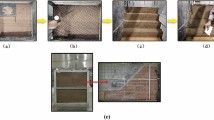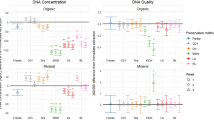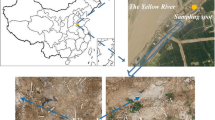Abstract
A MAJOR difficulty in investigations of biological processes in soils is the preservation of the biological activity from the time of collection of the soil sample in the field until commencement of the laboratory investigation. Freezing of soil samples could feasibly be the means of preserving this biological activity since microbial growth ceases and enzymatic actions are retarded at low temperatures. Gasser1 has suggested that the nitrifying activity in freshly sampled soil can be retained in this way. Since then, other workers have shown that when soils frozen at temperatures of −78° C and −190° C are thawed and incubated, increased nitrogen mineralization and aerobic respiration result2,3.
This is a preview of subscription content, access via your institution
Access options
Subscribe to this journal
Receive 51 print issues and online access
$199.00 per year
only $3.90 per issue
Buy this article
- Purchase on Springer Link
- Instant access to full article PDF
Prices may be subject to local taxes which are calculated during checkout
Similar content being viewed by others
References
Gasser, J. K. R., Nature, 181, 1334 (1958).
Soulides, D. A., and Allison, F. E., Soil Sci., 91, 291 (1961).
Mack, A. R., Nature, 193, 803 (1962).
McGarity, J. W., Plant and Soil, 14, 1 (1961).
Author information
Authors and Affiliations
Rights and permissions
About this article
Cite this article
MCGARITY, J. Effect of Freezing of Soil on Denitrification. Nature 196, 1342–1343 (1962). https://doi.org/10.1038/1961342a0
Issue Date:
DOI: https://doi.org/10.1038/1961342a0
This article is cited by
-
Frost formation in the ecotonal zone and its role for release of nutrients
Hydrobiologia (1993)
-
The influence of glucose and other sources of carbon on nitrate reduction rates in two temperate forest soils
Plant and Soil (1988)
-
Factors influencing high denitrifying activity in the subsoil of solodized solonetz
Plant and Soil (1971)
-
The effect of nitrate and nitrous oxide on hydrogen and methane accumulation in anaerobically-incubated soils
Plant and Soil (1967)
Comments
By submitting a comment you agree to abide by our Terms and Community Guidelines. If you find something abusive or that does not comply with our terms or guidelines please flag it as inappropriate.



